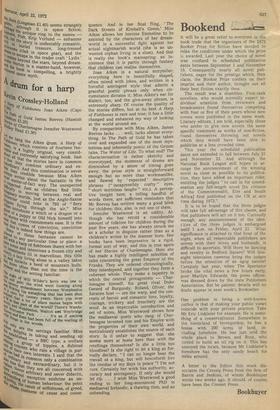Bookend
It will be a great relief to everyone in the book trade that the organisers of the 1972 Booker Prize for fiction have decided to relax the conditions under which the prize is awarded. Last year the choice of novel was confined to scheduled publication dates between September 1 and November 15. Consequently nearly all novel publishers, eager for the prestige which, they claim, the Booker Prize confers on their imprint and their author, brought out all their best fiction exactly then.
The result was a shambles. First-rank novelists, who would normally expect individual attention from reviewers and broadcasters found themselves competing with four or five of their peers whose new novels were published in the same week. Literary editors, I am told, especially those who prefer to give new novels the same specific treatment as works of non-fiction, found themselves throwing out novels which they would have been able to publicise at a less crowded time.
This year the scheduled publication dates are extended to fall between July 21 and November 23. And although the National Book League still hopes to arrange the announcement of the winning novel as close as possible to its publication, they have added an important rider, entitling the judges "to call in for consideration any full-length novel [by citizens of the Commonwealth, Eire and South Africa] first published on the UK at any time during 1972."
It is to be hoped that the three judges will take full advantage of this clause, and that publishers will act on it too. Curiously enough, any announcement of the ident:ties of the three judges is embargoed until 1 a.m. on Friday, April 21. What significance is attached to that hour of the night, when all respectable publishers are asleep with their wives and husbands, is difficult to ascertain. Will there be dancing and revelry in Bedford Square? Will latenight television cameras bring the judges before the attention of an agog nation? Certainly last year, when The Spectator broke the vital news a few hours early, poor Marilyn Edwards, the press officer, was dressed down by the irate Publishers Association. But be patient: details will no doubt appear in next week's Bookseller.
One problem in being a well-known author is that of making your public views coincide with your private practice. Take Mr Eric Linklater for example. He is something of a conservationist. Somewhere in the hinterland of Invergordon, he has a house with 200 acres of land, including foreshore. He has just sold the whole place to Brown and Root, who Intend to build an oil rig on it. This has annoyed the locals, because Mr Linklater's foreshore has the only sandy beach for miles around.
A letter to the Editor this week dissociates the Cressip Press from the firm of Barrie and Jenkins, of whom Bookbuyer wrote two weeks ago. It should, of course, have been the Cresset Press.
Bookbuyer










































 Previous page
Previous page